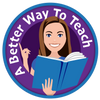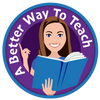Many of us, as adults, listen to podcasts on our commutes, when exercising, or doing mindless tasks like laundry, but podcasts absolutely work in the high school English classroom as well. There are a wide range of podcasts out there, so I’m going to narrow it down to some I have personally seen work well in the secondary classroom. These are podcasts that are relevant to teens’ lives and help them develop meaningful skills while listening.

Why Use Podcasts in High School ELA
The amount of skills that can be taught via podcasts is extensive. I’ll dive into a few here, but this is certainly not a comprehensive list of all the benefits of using podcasts in your classroom (if you want to read more on that topic check out my post: Four Reasons To Teach Podcasts and What The Research Says)
1.) Podcasts allow for active listening.
First, perhaps obviously, podcasts allow students to develop active listening skills. However because podcasts are designed with keeping the listener’s attention, the podcast itself does the heavy lifting of keeping your students engaged. For instance, some podcasts use music or voiceovers to engage the listener. Others choose topics so meaningful or mysterious that you are compelled to pay attention.
Even with all these great production techniques though, it’s possible for students to zone out, of course. So, keep reading, I have a few tips to keep your kids listening.
The skill of active listening matters, so it’s critical to give students the opportunity to hone this skill.
Some students are auditory learners. By giving them the opportunity to take in information in this way, you are allowing them to have a path to success. For instance, many students with dyslexia prefer to learn information through listening rather than reading. Of course they need to know how to read well, and they need to continue to work on this skill, but if you allow them opportunities to take in information through listening, they will have a chance to go deep into certain subjects without the obstacle of reading the information.

2.) Podcasts allow for student-led work and autonomy.
More and more our high schools are moving toward models of self-directed learning, problem-based learning, and self-propelled work. I am 100% in favor of this type of learning. I’m sure I’ll write another blog post all about that pretty soon. But for now, let me just say that if we can allow our students to self-direct, it gives students the chance for deep, meaningful learning.
Podcasts allow for just that type of learning.
While you can allow students to listen to podcasts as an entire class, they can also listen individually, pausing when needed to jot down notes or take a stretch break. They can be in charge of the speed at which they take in information, and if they do zone out for a few seconds, they can rewind the podcast.
When we give students opportunities to self-direct or move at their own pace, they will learn better and retain the information longer. There is a ton of research backing this up. A report from Frontiers in Psychology explains that “self-directed learning enables individuals to improve their self-confidence, autonomy, motivation and lifelong learning skills,” and encourages leadership and deep learning (Tekkol and Demirel). Read the full article here.
You can also give students multiple podcasts that cover a certain topic and allow students to listen to the ones that they choose. This gives them freedom and choice, but still allows them to listen and learn within the parameters you’ve set.

3.) Podcasts reinforce concepts like summarizing, paraphrasing, and analyzing
Think about how much time you spend teaching and reviewing skills like summarizing, paraphrasing, and analyzing. Probably a lot!
Usually we do this in the context of literature, and that is fine. But some students struggle with mastering these concepts, not because the concept itself is hard to master but because the subject they are working with is not interesting to them.
For instance, I recently worked with seniors who were writing essays on the play A Doll’s House, but many of the students just didn’t connect with the play. So they legitimately struggled with paraphrasing key sections and analyzing the importance of it.
What if instead of always teaching these skills in the context of literature, sometimes we give them another topic with which to work. Enter podcasts. If students listen to a highly-engaging podcast and then we ask them to paraphrase, summarize, question, and analyze, they will be able to work on those key skills more fully because the subject is interesting to them. If the topic is interesting to them, they are far more likely to think about it deeply and bring their own connections and questions to it.
4.) Podcasts serve as great jumping-off points for research and other work.
Podcasts cover such a range of compelling topics that you can easily use these for jumping-off points for research or other projects.
Here’s something to think about: what if when we teach the research process we allow students to research what they want to find out more about rather than researching topics from a prescribed list that the teacher has compiled.
For instance, there’s an amazing podcast that details the lives and obstacles of famous people called Imagined Life. I’ll go into more detail about it later in this post. But for now, let me just say that this is the type of podcast where you could have students listen to it, and then easily complete their own research on a famous person of their choosing. They can work on many of the skills that you would work on with a typical research experience--finding and evaluating sources, paraphrasing, summarizing, quoting directly, and integrating quotes into their own writing. But they could do all this for a topic about whom they really want to know more.
What Podcasts Work In High School ELA
Use the Imagined Life Podcast to Teach Research
What It’s About
Imagined Life immerses the listener into the story of a famous person’s life. It details their obstacles and their successes along the way. The style is narrative non-fiction, so it has lots of fiction elements like foreshadowing, flashbacks, and conflicts, but it’s all based on this person’s actual life. The twist is that you don’t know who the famous person is until the very end. You’re given little clues here and there that can help you figure it out. Also it’s kind of fun because it’s told in second person, so it really thrusts you into the story.
Why It Works
The stories themselves are engaging. The use of second person point of view to tell the story grabs you and keeps your attention. It’s engaging, and students must actively listen to figure out who the person is.
How To Teach It
Use listening guides for students to jot down the clues that they hear that can lead them to figuring out who the subject of the podcast is. Then, have students discuss the elements of story from different episodes. After listening to a few, tell students to research any person they’d like to know more about and write an Imagined Life style podcast on that person.
I’ve got this entire two-week unit in the English Teacher Vault. It’s totally customizable, includes all the listening guides you need, recommended episodes to listen to, a culminating assignment, a clear rubric for easy grading, and even an exemplar essay.
Use Radiolab podcast to delve into controversial topics and persuasive writing
What It Is
Radiolab is a compelling podcasts that has a huuuuuuge ranger of topics. Some of my favorite are topics that explore everyday ideas through multiple stories. They’re engaging because they include lots of interviews and cool production techniques that keep you listening. Radiolab also works great if you are implementing cross-curricular teaching.
How To Teach It
Choose an episode of Radiolab and have students write down key points as they listen. This allows them to practice summarizing, paraphrasing, and quoting directly. If the topic is a controversial one, you can spend time at the end of class having a student-led discussion on where they fall on the issue.
One of my favorite episodes for this type of deep thinking is called “The Good Samaritan,” and you can find it HERE to listen.
I’ve created a 2-3 day lesson that allows students to listen, take meaningful notes, engage in a class discussion, and ultimately write about their thoughts on this controversial law. It will be added to the English teacher vault in the coming days.
Use The Podcast Scattered In Conjunction With Memoir Writing
What It’s About
Friends, my love for this podcast is soooooo deep. Comedian Chris Garcia tells the story of his recently deceased father, an immigrant who struggled when he came to the US. Chris tells his story in a way that brings you into his father’s life. If you want to develop empathy in your students or expose them to one immigrant’s experience, this is a great way to do it.
Also, if I might add, Chris Garcia is a really cool guy. When I reached out to him about making resources for his podcast, he offered to zoom with my class. And he did! We met him! He talked to us all about the podcast, his life, and it was one of my best days ever.
How To Teach It:
Have students jot down key points about the story as they listen like characterization, conflict, and the history of Cuba.
Then, give students the assignment of interviewing a family member and completing a short memoir of this person.
I’ve got this entire 2 week unit HERE. When I taught this, I do believe it led students to empathizing more with immigrants as it was a deep journey into one man’s story.
Want a few more ideas for writing types and ways you can pair it with high-interest podcasts? Check out a few more suggestions below!


Tips For Using Podcasts
Since podcasts require listening for long chunks of time, I highly suggest these four things:
- Don’t overload your students with taking detailed notes, but listening guides are helpful.
- Give space on handouts to doodle or color.
- Consider providing peppermints or lollipops while students listen.
- One stretch break mid-podcast can help break up a long podcast.
Those are a few of my personal hacks for listening to podcasts. If you’ve got more, let me know in the comments!
Teaching Podcasts In English Brings Depth To Your Classroom
This is obviously not a comprehensive list for podcasts that work in the classroom, but it’s a good start. And since I’ve made resources for all of these podcasts, you don’t have to spend any time figuring out how to do it. I hope you find that these podcasts work in your classroom as well, and if you do, please let me know! I’d love to hear from you.
If you want access to over 100 resources like the ones mentioned in this article, check out the English teacher vault. We will be adding resources for podcasts regularly!
Resources To Teach Podcasts:
Related Articles:
5 Podcasts For High School English Classrooms – Around the World With Mrs. C (aroundtheworldwithmrsc.com)
Another Great Podcast for the Classroom | Laura Randazzo – Solutions for the Secondary Classroom
50 Of The Best Podcasts For High School Students - (teachthought.com)
Podcasts For Career Exploration
6 Poetry Podcasts For ELA (SmithTeaches9to12)








Leave a comment